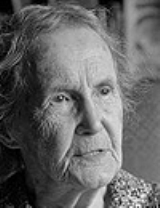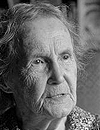
Alicia Moreau de Justo
Encyclopedia

Argentina
Argentina , officially the Argentine Republic , is the second largest country in South America by land area, after Brazil. It is constituted as a federation of 23 provinces and an autonomous city, Buenos Aires...
physician
Physician
A physician is a health care provider who practices the profession of medicine, which is concerned with promoting, maintaining or restoring human health through the study, diagnosis, and treatment of disease, injury and other physical and mental impairments...
, politician, pacifist and human rights
Human rights
Human rights are "commonly understood as inalienable fundamental rights to which a person is inherently entitled simply because she or he is a human being." Human rights are thus conceived as universal and egalitarian . These rights may exist as natural rights or as legal rights, in both national...
activist.
Born to French
France
The French Republic , The French Republic , The French Republic , (commonly known as France , is a unitary semi-presidential republic in Western Europe with several overseas territories and islands located on other continents and in the Indian, Pacific, and Atlantic oceans. Metropolitan France...
parents in London
London
London is the capital city of :England and the :United Kingdom, the largest metropolitan area in the United Kingdom, and the largest urban zone in the European Union by most measures. Located on the River Thames, London has been a major settlement for two millennia, its history going back to its...
, United Kingdom
United Kingdom
The United Kingdom of Great Britain and Northern IrelandIn the United Kingdom and Dependencies, other languages have been officially recognised as legitimate autochthonous languages under the European Charter for Regional or Minority Languages...
, the Moreau family moved to Argentina while Alicia was still a child.
There she studied both for school teacher first, and then became the fourth woman to graduate as physician in the country.
She started her political activity in 1906 during the International Congress of Free Thought. She acquired connections in the Socialist Party
Socialist Party (Argentina)
The Socialist Party is a social-democratic political party in Argentina. The history of socialism in Argentina began in the 1890s, when a group of people, notably Juan B. Justo, expressed the need for a greater social focus....
, and worked as a collaborator at the International Socialist Magazine.
In 1910 she was part of the foundation of the Ateneo Popular association of high-school and university extension, and became its general secretary. Her political activity continued with the claims for working days of 8 hours. That same year she also participated in the organization of the First International Feminine Congress, and in 1911 initiated a campaign for the creation of schools for immigrants. In 1918 she founded the National Feminine Union.
Alicia Moreau married Juan B. Justo
Juan B. Justo
Juan Bautista Justo was an Argentine physician, journalist, politician, and writer. After finishing medical school he joined the Unión Cívica Radical, later participating in the foundation of the Socialist Party in 1896, of which he was chief director until his death...
in 1922, with whom she was to have 3 children, adding to her surname 'de Justo'.
In 1925 the work regulations for women and children were dictated, as well as the civil rights
Civil rights
Civil and political rights are a class of rights that protect individuals' freedom from unwarranted infringement by governments and private organizations, and ensure one's ability to participate in the civil and political life of the state without discrimination or repression.Civil rights include...
of the woman in 1926.
She then focused in incrementing the political participation of women in politics creating feminine gatherings within the socialist centers. In 1945 she published the book "The woman within democracy" (La Mujer en la Democracia), in which she exposed the struggle of the Argentine women to obtain the right of vote.
In 1956 she was named director of the magazine La Vanguardia, after an internal reorganisation. Two years later the Socialist Party divided into the Partido Socialista Democrático
Democratic Socialist Party (Argentina)
The Democratic Socialist Party was a political party in Argentina formed in 1959 as a division of the Socialist Party.The most important figure of the PSD was Alfredo Bravo, a teacher and civil rights activist, which was a deputy and the presidential candidate of the Socialist Party in the 2003...
, and the Partido Socialista Argentino
Popular Socialist Party (Argentina)
The Popular Socialist Party was a political party in Argentina formed in 1972 with the merger of the Argentine Socialist Party, the Movimiento de Acción Popular Argentino and other minor groups....
, of which she was still the general secretary.
She was a firm supporter of different events related to human rights; she collaborated with the Madres de Plaza de Mayo, and was part of the reception committee during the visit to Argentina in 1980 of the Inter-American Commission on Human Rights
Inter-American Commission on Human Rights
The Inter-American Commission on Human Rights is an autonomous organ of the Organization of American States .Along with the...
of the Organization of American States
Organization of American States
The Organization of American States is a regional international organization, headquartered in Washington, D.C., United States...
, reporting the Dirty War
Dirty War
The Dirty War was a period of state-sponsored violence in Argentina from 1976 until 1983. Victims of the violence included several thousand left-wing activists, including trade unionists, students, journalists, Marxists, Peronist guerrillas and alleged sympathizers, either proved or suspected...
crimes of the military government.
The main street of the Puerto Madero
Puerto Madero
Puerto Madero, also known within the urban planning community as the Puerto Madero Waterfront, is a barrio of the Argentine capital at Buenos Aires CBD, occupying a significant portion of the Río de la Plata riverbank and representing the latest architectural trends in the city of Buenos...
barrio
Barrio
Barrio is a Spanish word meaning district or neighborhood.-Usage:In its formal usage in English, barrios are generally considered cohesive places, sharing, for example, a church and traditions such as feast days...
(neighbourhood) in Buenos Aires
Buenos Aires
Buenos Aires is the capital and largest city of Argentina, and the second-largest metropolitan area in South America, after São Paulo. It is located on the western shore of the estuary of the Río de la Plata, on the southeastern coast of the South American continent...
is named after her.
External links
- Alicia Moreau de Justo Foundation (Archived 2009-10-25) (Spanish)
- Profile (Spanish)
- Short Biography at the Konex FoundationKonex FoundationKonex Foundation is an Argentine cultural non-profit organization created in 1980 to promote, stimulate, help, and participate in any form of cultural, educational, intellectual, artistic, social, philanthropic, scientific or sports initiative, work, and enterprise, in their most relevant aspects,...
(Spanish) - Obituary at the New York Times

